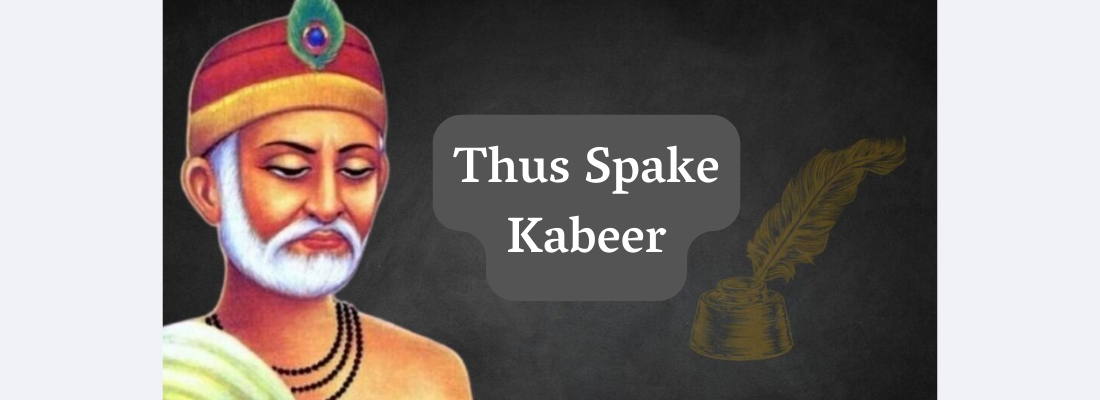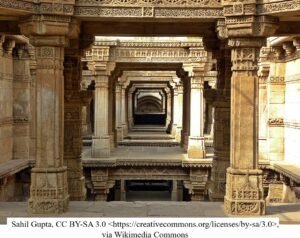Kabeerdaas ji is categorized as a saint but his thoughts and compositions are not confined to religion, spirituality, meditation and bhajans alone. He also deals with worldly life – the character and behaviour of individuals; practices (and malpractices) rampant in society; evils of caste system which divides people into ‘high’ and ‘low’ classes, etc. He also goes in depth in denouncing superstitions and hypocrisy prevalent in practice of religions and sects in general. He considers them as obstructions in the way of health, peace and happiness of society. We should take all these things into account if we want to understand and interpret Kabeer’s poetry correctly.
— Kusum Banthia
निन्दक नियरे राखिये, आँगन कुटी, छवाय ।
बिन पानी, साबुन बिना, निर्मल करे सुभाय।।
Nindak niyare raakhiye, aangan kutii, chhavaaya
Bin paanii saabun binaa, nirmal kare subhaaya
We get irritated by people who find faults in us, discuss them behind our backs or even to our face, and defame us. We do not want them to come near us. But Kabeerdaas ji suggests that far from shunning them, we should always keep them close by us. In fact, we should build a shelter for them in our own courtyard. It will benefit us in that the blemishes in our character will be washed away even without soap or water.
Through the criticism of the fault finders we will become aware of our shortcomings and will try to get rid of them. Thus, the criticism will act as soap and water an, gradually, the flaws of our mind and character will vanish. Just as soap and water wash our bodies clean, the criticism of our fault finders will cause our mind and character to be cleansed. We will become better person.(This will benefit not only us , but the society as a whole.)

जहाँ दया तहाँ धर्म है, जहाँ लोभ तहाँ पाप ।
जहाँ क्रोध तहाँ काल है, जहाँ छिमा तहाँ आप।।
Jahaan dayaa tahaan dharma hai, jahaan lobh tahaan paap
Jahaan krodh tahaan kaal hai, jahaan chhimaa tahaan aap
Literally — Where there is kindness, there is dharma (righteousness); where there is greed, there is sin ; where there is anger, there is destruction ; where there is forgiveness, there is God.
In this couplet Kabeerdaas ji is talking about two virtues and two vices and where they lead us to. Kindness or compassion is a great virtue and core of all religions since they all preach compassion towards all living beings. Thus, a kind and compassionate person can be said to have acquired the essence of religion.
A greedy person, on the other hand, can go to any length to acquire the object of his desire however harmful or distressing the process may be for others. Therefore, Kabeerdaas ji considers greed to be a cause of sin.
Anger destroys a person’s ability to think clearly and logically and he also stops listening to his conscience. This tendency plays havoc with his life and that is why Kabeerdaas ji calls it ‘kaal’ — the power that destructs all.
Forgiveness encompasses qualities like love, generosity, tolerance, equanimity, non-violence, etc. that lead a person to God — to realisation of his own divine self.
- Kabeerdaas ji, like many saints before and after him, uses the word “Dharma” not in the sense of some organized religion or sect with its own mythology, prescribed rituals and practices, and, loyal devotees. “Dharma” here means right conduct or righteousness. It is a virtue devoted to the service of all living beings and to improvement of self.
- Kabeerdaas ji here uses the word “aap” not in the sense of reflexive pronoun (self) or second personal pronoun (honorific form of ‘you’) but in the sense of God Himself. When we realise His presence within us, the difference between His SELF and our ‘self’ vanishes and we become one with Him.

-
Thus Spake Kabeer 01
Kabeerdaas ji is categorized as a saint but his thoughts and compositions are not confined to religion, spirituality, meditation and bhajans alone. He also deals with worldly life – the character and behaviour of individuals; practices (and malpractices) rampant in society; evils of caste system which divides people into ‘high’ and ‘low’ classes, etc. He…
-
Thus Spake Kabeer 02
Kabeerdaas ji is categorized as a saint but his thoughts and compositions are not confined to religion, spirituality, meditation and bhajans alone. He also deals with worldly life – the character and behaviour of individuals; practices (and malpractices) rampant in society; evils of caste system which divides people into ‘high’ and ‘low’ classes, etc. He…
-
Thus Spake Kabeer 03
Kabeerdaas ji is categorized as a saint but his thoughts and compositions are not confined to religion, spirituality, meditation and bhajans alone. He also deals with worldly life – the character and behaviour of individuals; practices (and malpractices) rampant in society; evils of caste system which divides people into ‘high’ and ‘low’ classes, etc. He…


